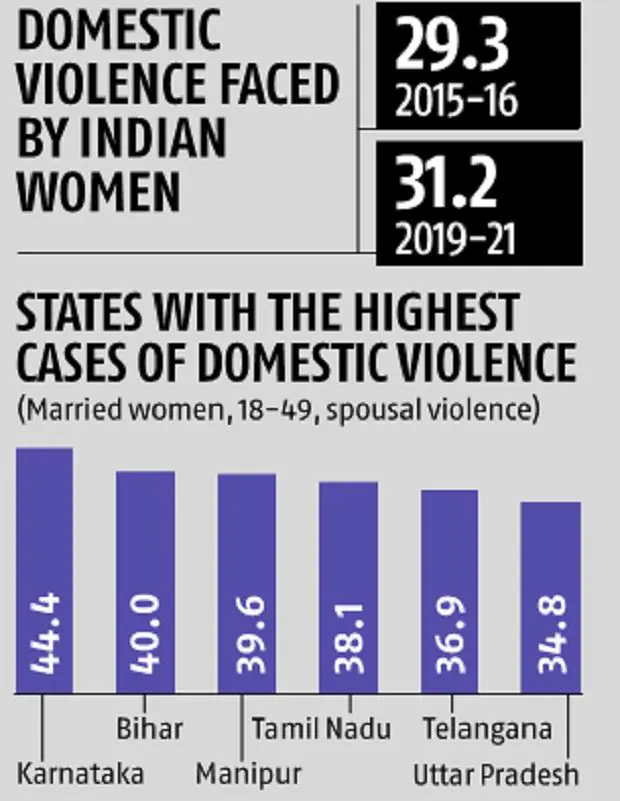- That is only the number of cases reported by women. There are frequently many more that never make it to the police.

What are the Factors Contributing to Domestic Violence?
- Gender Disparities:
- India's wide gender gap, as reflected in global indices, contributes to a sense of male superiority and entitlement.
- Men may use violence to assert dominance and reinforce their perceived superiority.
- Alcohol or drug misuse that impairs judgement and exacerbates violent tendencies. Intoxication leads to loss of inhibitions and escalation of conflicts into physical or verbal abuse.
- There is a strong correlation between domestic violence and the dowry system, with instances of violence increasing when dowry expectations are not met.
- Despite legislation prohibiting dowry, such as theDowry Prohibition Act 1961, cases of bride burning and violence related to dowry persist.
- Traditional beliefs and practices perpetuate gender roles and household power imbalances.
- Patriarchal systemsthat prioritise male authority and control over women. Violence often stems from notions of ownership over women's bodies, labour, and reproductive rights, reinforcing a sense of dominance.
- Desire for dominance and exertion of control over a partner, stemming from insecurity or entitlement.
- Poverty, and unemployment, create additional stresses within households, increasing the likelihood of violent behaviour.
- Untreated mental health conditions such as depression, anxiety, or personality disorders that contribute to volatile behaviour.
- Limited understanding of healthy relationship dynamics and rights, leading to acceptance or normalisation of abusive behaviour.
- Ignorance about legal protections against domestic violence or available support services.
What Legal Frameworks Address Domestic Violence in India?
Global Initiatives:
- Convention on the Elimination of All Forms of Discrimination against Women (CEDAW):
- Adopted in 1979 by the UN General Assembly, CEDAW works towards eliminating discrimination against women in all areas of life.
- The 1993 DEVAW was the first international instrument explicitly addressing violence against women, providing a framework for national and international action.
- This initiative is a flagship program by UN Women aimed at preventing and responding to sexual harassment and other forms of violence against women and girls (W&G) in public spaces.
- It works collaboratively with city governments, local communities, and civil society organisations.
- The 1995 Beijing Platform for Action identifies specific actions for governments to take to prevent and respond to violence against women and girls.
Why is Enforcement of Laws Against Domestic Violence Challenging?
- Social:
- Victims often hesitate to report domestic violence due to societal stigma, fear of retaliation, or concerns about family reputation. This silence makes it challenging for authorities to take action.
- Domestic violence incidents are often underreported. Victims may not recognise certain behaviours as abuse or may normalise them.
- Many people, including victims, are unaware of their legal rights and available resources. Without awareness, reporting and seeking legal help become difficult.
- Victims may be financially dependent on their abusers. Fear of economic repercussions can prevent them from seeking legal assistance.
- Law enforcement agencies and judicial bodies may lack proper training on handling domestic violence cases. Inconsistent implementation of laws hinders effective enforcement.
- Proving domestic violence in court requires substantial evidence. Lack of witnesses or physical evidence can weaken cases.
- Domestic violence often occurs within family units. Legal actions can disrupt family relationships, making victims hesitant to pursue legal remedies.
- Different cultural norms and practices affect how domestic violence is perceived and addressed.
- Enforcement strategies must consider these variations.
Way Forward
- A fundamental prerequisite is a transformative change in attitudes towards gender roles and power dynamics. Initiatives targeting both men and women are crucial for fostering mutual respect and dismantling the patriarchal mindset deeply ingrained in society.
- Mandate gender perspective training for stakeholders like law enforcement, service providers, and magistrates to foster empathy and victim-centred approaches.
- Ensure victims have access to free or low-cost legal representation throughout the court process.
- Implement programs that equip survivors with job training and financial literacy skills, fostering economic empowerment.
Q. Discuss the socio-cultural, economic, and legal challenges hindering the effective enforcement of laws against domestic violence in India.
UPSC Civil Services Exam Previous Year Questions (PYQ)
Prelims:
Q. ‘Beijing Declaration and Platform for Action’, often seen in the news, is (2015)
(a) a strategy to tackle the regional terrorism, an outcome of a meeting of the Shanghai Cooperation Organization
(b) a plan of action for sustainable economic growth in the Asia-Pacific Region, an outcome of the deliberations of the Asia-Pacific Economic Forum
(c) an agenda for women’s empowerment, an outcome of a World Conference convened by the United Nations
(d) a strategy to combat wildlife trafficking, a declaration of the East Asia Summit
Ans: (c)
Mains:
Q. We are witnessing increasing instances of sexual violence against women in the country. Despite existing legal provisions against it, the number of such incidences is on the rise. Suggest some innovative measures to tackle this menace. (2014)
Q. How does patriarchy impact the position of middle-class working women in India? (2014)